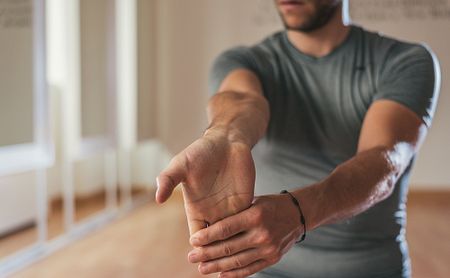Pilates Helps Men With MS Gain in Balance to Lower Fall Risk, Study Finds

Pilates, done regularly, can significantly improve balance and posture in men with multiple sclerosis (MS), helping them to avoid falls and the injuries they can bring, a small randomized trial in Iran reports.
The study, “Effect of Twelve weeks Pilates training on functional balance of male patients with Multiple Sclerosis: Randomized controlled trial,” was published in the Journal of Bodywork & Movement Therapies.
Difficulties with maintaining balance and controlling posture are common to MS patients, raising a risk of falls that encourages a more sedentary lifestyle.
Yet, regular exercise and physical activity have multiple health benefits for these patients, from increasing muscle strength and flexibility, to helping with cardiac health, mental well-being, and fatigue.
Pilates done on a mat is low impact, and works to strengthen groups of muscles. Designed to help people with injuries or with a limited capacity for exercise, it improves balance, posture, and a person’s range of motion with regular practice.
Researchers in Iran, along with colleagues in Denmark and New Zealand, conducted a small clinical trial (UMIN000038431) to evaluate whether Pilates might improve balance in MS patients.
Balance, the study noted, is “a complex motor skill which defines the postural dynamics of the body, which is important for preventing falls … [and] strength-based exercises can play a role in improving balance abilities and can be conducted to improve postural malalignment because they are directly connected to health.”
A total of 30 male patients (mean age, 31.4) were enrolled and randomly assigned, 1:1, to either Pilates training three times per week for 12 weeks, or to no exercise as a control group.
Patients in both groups had significant disabilities, as indicated by a mean score of 4.55 in the Expanded Disability Status Scale (EDSS), which quantifies disability on a scale ranging from one (no disability) to 10 (severe disability leading to death).
The Pilates training program consisted of 60-minute sessions with exercises focused on spinal extension, abdominal strengthening, core stabilization, and postural correction. Each session gradually increased in difficulty, from beginner to an advanced level, based on an individual’s ability to progress.
Each session started with a 10-minute warmup, followed by 45 minutes of Pilates and then five minutes of stretching to cool down.
Changes in balance and posture over the 12-weeks of training were determined using three distinct measures: the Berg’s Balance Scale (BBS), which assesses postural control by having patients perform tasks such as standing up on a chair or standing with closed eyes; the Timed Up and Go (TUG), which measures the time it takes for a patient to stand up from a chair, walk three meters, turn around and sit on the chair again; and the Functional Reach Test (FRT), which measures the maximum distance a patient can reach forward while standing in a fixed position.
While TUG is designed to measure balance, mobility, ability to walk and risk of falling, FRT evaluates dynamic balance.
Patients in the Pilates group showed significant improvements in all three scores over these three months. Their BBS scores increased significantly from 46.8 to 50.60 points; TUG scores decreased significantly (meaning patients were faster at this task), from 11.7 to 9.8 seconds; and the FRT scores rose from 30.1 to 38.2 cm.
In contrast, those in the control group showed no significant changes in posture and balance over this same period, with a tendency toward worsening BBS and FRT scores.
A comparison between the two groups showed that balance and postural measures were significantly better in the Pilates group after the 12 weeks of training.
Overall, these findings suggest that “Pilates exercise increases the functional balance of the patients with multiple sclerosis,” the researchers wrote, noting their findings are consistent with other studies into Pilates in MS patient groups.
“Regular Pilates reduces common risk factors for falls in MS patients, which may reduce therapeutic costs and can be considered as a complementary therapeutic approach for physical therapists and corrective exercise experts,” the study concluded.






